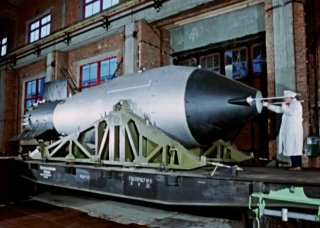Nuclear Weapons: It’s Time for Sole Purpose
The “sole purpose” of U.S. nuclear weapons should be to deter and—if necessary, retaliate against—a nuclear attack. This would mark a significant change in U.S. nuclear policy, eliminating ambiguity that preserves the option to use nuclear weapons first in response to a conventional attack.
Adopting the sole purpose would send an interesting signal to China. Some analysts question whether Beijing will continue to adhere to a no first use policy, but the Pentagon reports that “China almost certainly keeps the majority of its nuclear force on a peacetime status—with separated launchers, missiles, and warheads,” a posture consistent with that policy. Adoption of the sole purpose could open the path to a strategic security dialogue with Beijing that has eluded Washington for years. It would raise the political costs to China of abandoning its no first use posture. A change in American policy might even help avoid the development of a U.S.-China nuclear standoff somewhat similar to that between Washington and Moscow during the Cold War.
The adoption of a sole-purpose policy would reduce the ability of a U.S. president to use nuclear weapons for saber-rattling. But giving up the option to rattle a saber that the adversary believes Washington would never draw seems to give up little.
A Nuclear Taboo?
It has been seventy-five years since the United States dropped two atomic bombs on Japan at the conclusion of World War II. Since then, neither America nor any other country has used nuclear arms in anger. Some suggest a taboo against nuclear use has developed.
The taboo is informal, not fixed by international agreement. It would benefit U.S. and allied security were non-use of nuclear weapons to become a widely accepted and entrenched international norm. The United States has powerful conventional forces, favorable geography and the world’s largest network of allies, so reducing the possibility of nuclear use seems very much in the U.S. interest, reducing one of the few existential threats to America’s existence. Sole purpose would help bolster that norm.
Adopting sole purpose would mark a significant change in U.S. policy. Washington should do so only after consulting with NATO and key allies in the Pacific region. Importantly, the sole purpose would not close the U.S. nuclear umbrella; it would mean that U.S. nuclear weapons would be used in an ally’s defense only after the other side had gone nuclear. Unlike nuclear first use, the threat of nuclear retaliation after a nuclear attack is credible.
The next U.S. nuclear posture review should, following such consultations, adopt sole purpose as the reason for U.S. nuclear weapons. That would change a dynamic that now has possible adversaries designing potentially dangerous policies and postures in a belief that the United States is lowering its threshold for use of nuclear weapons and could go nuclear first. It would boost the establishment of an international norm against any nuclear weapons use. It could help make Americans safer. And the only cost: abandoning an option that an American president would never use and whose threat has little credibility.
Steven Pifer is a William Perry Research Fellow at Stanford’s Center for International Security and Cooperation and a retired U.S. Foreign Service officer.
Image: Reuters

